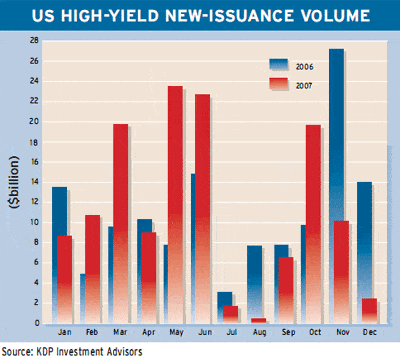Corporate Debt
While money market pressures appear to be slowly receding, worries about a possible US recession that could trigger a surge in corporate defaults are moving to the fore for 2008.
“If round one of the current credit crisis has been about the impact on money markets and bank financing, round two looks set to be about the effects on the global economy and the resulting default rates,” according to a report by Citi research strategists Matt King in London and Ratul Roy in New York.
 Citi’s proprietary econometric model, which takes into account a number of macroeconomic and monetary variables, suggests that default rates on speculative-grade corporate debt may increase to 5.5% by the end of this year or early in 2009. A tightening of lending standards is one reason defaults are expected to rise.
Citi’s proprietary econometric model, which takes into account a number of macroeconomic and monetary variables, suggests that default rates on speculative-grade corporate debt may increase to 5.5% by the end of this year or early in 2009. A tightening of lending standards is one reason defaults are expected to rise.
Citi’s forecast is somewhat higher than that of Moody’s Investors Service, which says the global speculative-grade default rate is at its lowest level in 26 years at about 0.9% but is likely to rise to 4.8% by the end of 2008. Moody’s says a weakening economy and a worsening in the ratings mix of speculative-grade issuers are contributing to increases in predicted default rates.
With defaults having remained so low for so long, the anticipated pickup in default rates is obviously of major concern to investors in collateralized loan obligations, or CLOs, according to Citi’s “2008 Global Structured Credit Outlook.”
“With so much uncertainty out there, investors’ outlooks for 2008 seem to run the gamut, from thinking that no form of structured credit will ever again see the light of day to the idea that by the end of the second quarter everything should return to normal,” the report says. “Inevitably, we think the truth lies somewhere in between.”
Growing demand for emerging markets, commodities, or even foreign-exchange-related structures, may help synthetic volume in 2008 even exceed the total of 2007, the Citi report says. Synthetic structures do not own underlying assets. “In structured credit, as in biology, environmental challenges may create pressure on organisms to evolve, and even cause the destruction of individual species, but they seldom result in the extinction of an entire animal kingdom,” according to the report.
The introduction of the Basel II revised international capital framework for banks, which came into effect on January 1, 2008, will make it more efficient for many financial institutions to hold structured credit, rather than the underlying collateral.
The Citi research strategists say they are optimistic that investors will gradually recognize the significant differences between structures. “While it is tough to be outright optimistic, for those with cash and who can get their heads around the technicals, we believe 2008 should actually provide some of the best trading and investment opportunities in credit for years,” the report says.
Meanwhile, the US high-yield bond market appeared to be going into hibernation in December, as new-issuance volume fell to the lowest level since August, during the height of the credit crisis.
The Securities Industry and Financial Markets Association is projecting a median 15% decline in fixed-income issuance this year, to $3.4 trillion from an estimated $4 trillion in 2007.
“Following strong issuance levels in 2007, when volume records were set in both the municipal and the corporate sectors, the consensus for 2008 reflects a slowing economic pace and continued concerns about the housing market,” says Michael Decker, senior managing director of research at the association.
Corporate bond issuance is expected to be $965 billion, which would be near historically high levels but down 14.8% from 2007.

Gordon Platt



